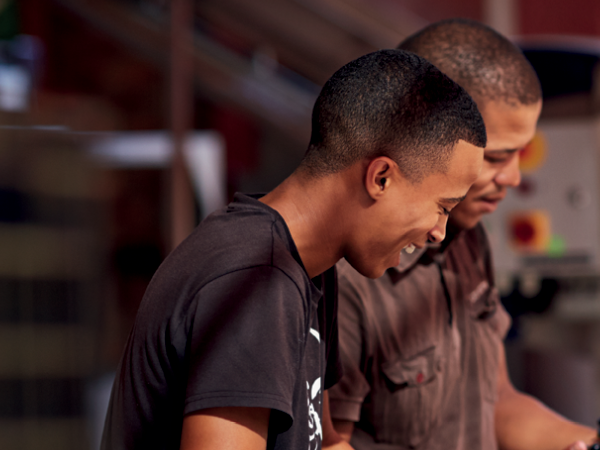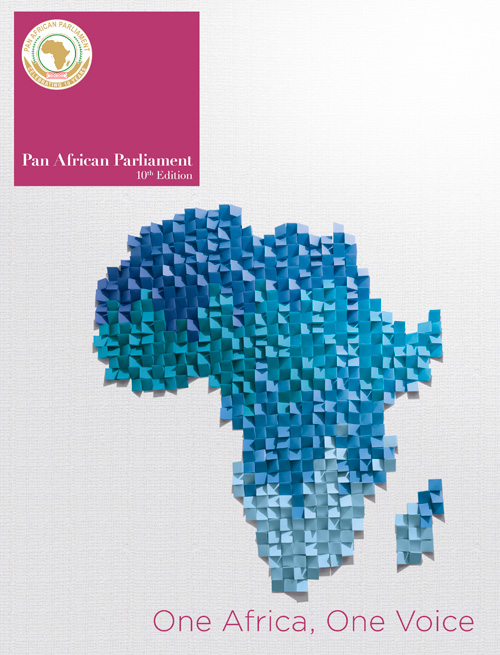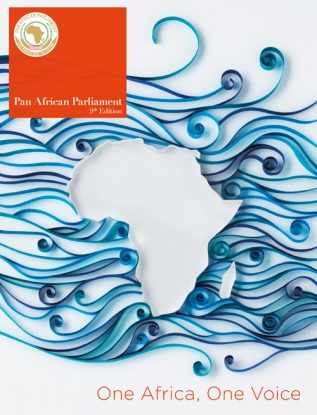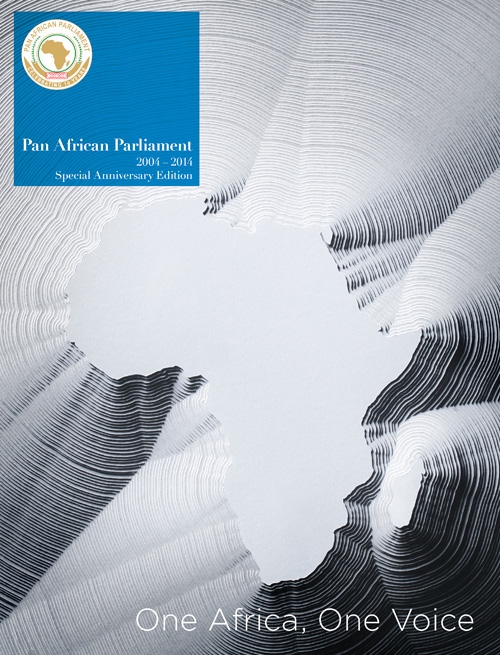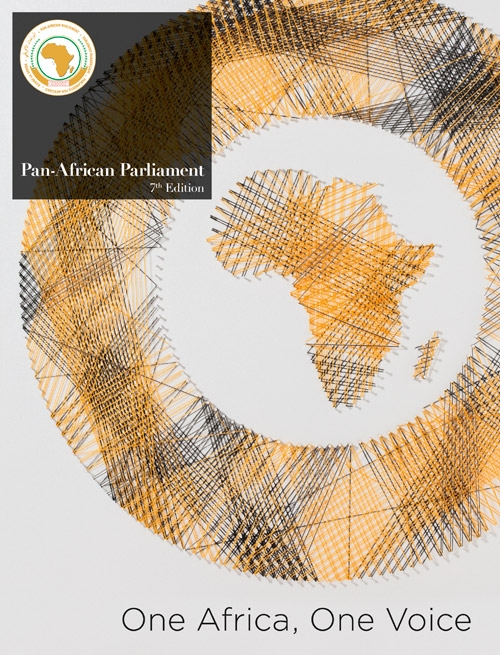
Youth Dialogue Day formed part of the celebrations marking the 10th anniversary of the PAP. The day was held on Monday 17 March 2014 in the Chamber of the Parliament, under the chair of Hon Bethel Nnaemeka Amadi, President of the PAP. The primary aim of the dialogue was to discuss African youth, and the main presentations on the agenda included:
- Youth, unemployment and migration, presented by Dr Olawale Maiyegun, Director of the Department of Social Affairs of the AU Commission.
- Youth, education and skills development, presented by Obert Mutumba from Unesco.
- Youth, peace and security, presented by Dr Martin Rupiya, who represented the African Public Policy and Research Institute.
- Youth and health in Africa, presented by Paska Kinuthia, the Youth and Social Organisation Officer at UNAIDS.
In his introductory speech, the Hon Assounana Malam Issa, President of the PAP Youth Caucus, explained what the main missions of the caucus are. It consists of strengthening and consolidating youth empowerment and collaborating with all the PAP Organs responsible for young people. He pointed out that the established public policies and programmes were proving to be ineffective in curbing the problems that undermine African youth.
Hon Issa said the PAP Youth Caucus was seeking the backing and support of the PAP Bureau to carry out an advocacy campaign on a continental level.
Before addressing the meeting, Ambassador Albino Aboug, President of the Pan-African Youth Council (PAYC) opened the floor to a group of young Africans in a discussion about the council. The PAYC is responsible for promoting young Africans and ensuring that the participation of the youth in decision-making occurs in each African State.
25% of all people under 25 live in Africa. This means that demographically, Africa is the youngest continent in the world
Hon Amadi took the stand and stated that the PAP had dedicated the day to establishing dialogue with the youth. The aim was to create exchanges on all matters that concerned them.
According to statistics, 25% of all people under 25 live in Africa. This means that demographically Africa is the youngest continent in the world. The youth represent a high proportion of the working population and they could potentially create great opportunities for Africa if decision-makers implement effective public policies.
Youth, unemployment and migration
When Dr Maiyegun took the stand, he told participants that Africa was facing a high rate of youth unemployment. This portion of the population was growing more rapidly than the continent’s economy. The gap was a result of the world economic crisis and diminished employment opportunities for the youth.
Young people have to receive the appropriate education and training, which needed to be adapted to the job market. This would help them adapt to working life. Migratory flow meant that young people were considering Europe when searching for better prospects, even if it meant risking their lives.
Unemployment also forced the youth to look for the best means of survival, again, sometimes at the risk of their lives. Migration was such a major concern for the PAP that it prompted Member States to adopt public policies encouraging job creation for young people.
Youth, education and skills development
Mutumba pointed out that 18% of the global population were young people, many of whom were ambitious, flexible and creative as well as energetic. They presented significant potential and could contribute towards social development.
Unesco supported the African Youth Union as well as entrepreneurship. It was also involved in developing young people’s skills. The organisation provides technical and financial support, advice and supervision. It took part in the implementation of projects, the establishment of these initiatives’ steering committees and the appoint-ment of national co-ordinators for projects.
Despite all the activities undertaken by Unesco, the circumstances of African youth was still cause for concern. It was up to Member States to establish measures to encourage vulnerable youth to stay in their countries and develop their full potential.
Youth, peace and security
Rupiya supported the theory of ‘a triangle of authority’ namely: the youth, African States and governance. Across the world, young people share similarities. They have the similar ambitions, aspirations, requirements, expectations and claims. African youth are therefore no different from those on other continents. But increasingly they are looking beyond the continent for opportunities.
African governments have to place the youth at the centre of their concerns and public policies so that young people can view the continent was the best place to be.
The PAP was responsible for reducing youth unemployment, which remained a demeaning and humiliating situation. Employing young people could be used positively to upgrade African States and ensure stability in the region. African governments have to try to cater to the needs of the youth. Members of Parliament have to convince government leaders to include the wishes of young people in their development policies instead of marginalising this group.
Young people have to receive appropriate education as well as training
In fact, the youth were marginalised during recent efforts to construct African States, and during the creation of the framework that formed part of the project to democratise Africa. Members of Parliament therefore had a role to play, which included being referees to ward off tensions among key parties. The energy of the youth could be harnessed by reconstructing the political economy, gradual industrialisation and the establishment of a clear link between education, occupational training and youth interaction.
Youth and health in Africa
According to Kinuthia, by 2050, the youth population would have increased markedly to 436 million. However, this group was vulnerable and lacked services.
Young people’s health was of particular concern in the world in view of the numerous international, regional and national commitments. The youth and HIV/Aids was an issue that frequently came up at every meeting.
UN statistics show a decline in the prevalence rate in 2010 in the 10–24 age group. Meanwhile, an AU report stated it also fell in the 15–35 category.
The slight improvement was due to the change in attitude among youth groups, their awareness of the use of condoms, early sexual intercourse and girls marrying at a young age, the commitment of traditional leaders, the youth’s access to services, as well as advice from healthcare organisations.
But Unicef stated that progress remained insufficient in terms of the very high mortality and infection rates. At the time of the presentation, 4.9 million people were living with HIV/Aids globally, and the vast majority lived in Africa. Some 52% of the cases of young people were in Southern Africa, while 22% were in West Africa.
Diseases such as malaria, tuberculosis and the death of women during or after childbirth were also health challenges to be tackled on the continent. Moreover non-communicable diseases were emerging, for example, cardiovascular disease, diabetes and cancer that, according to statistics, were exceeding the mortality rate from endemic infectious diseases.
The role of Members of Parliament is to create a framework that can replace the UN’s Millennium Development Goals so that the alarming health situation in Africa can be controlled. The PAP could increase dialogue on health in Member States. It could strengthen the AU Charter, which defends the interests of young people and women.
Conclusion
The participants at the Youth Dialogue Day concluded that government and Parliamentary authorities in Africa should work towards defending the interests of young people. Furthermore, the PAP had a responsibility in the legislative field as its Members had to initiate law proposals to protect and defend the interests of the youth in their respective Parliaments.
It was completely advantageous to the government of each Member State to take on inclusive public policies and promote the participation of young people during decision-making.
It was recommended that all AU Member States implement the African Youth Charter in their countries; create environments conducive to the retention of graduates on the continent; implement effective policies to facilitate the access of young people to education and training; establish policies aimed at creating jobs for the youth to prevent illegal immigration; and that the AU work towards continental integration through the free movement of people, goods and services in Africa.
At the end of the session, the President of the PAP thanked the youth and Members of Parliament for their participation in the day’s meaningful dialogue. He undertook, on behalf of the Bureau, to meet African political leaders to implement a programme of action aimed at the youth across the continent.


